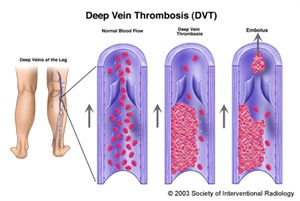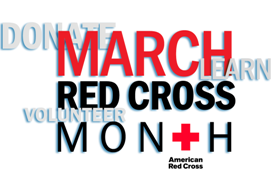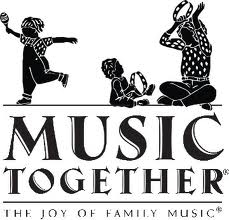Brain Injury Awareness Month on March, 2025: Do you think having "Black History Month" helps or hinders race relations in America?
March, 2025 is Brain Injury Awareness Month 2025. Brain Injury Awareness Month Dedicated to providing hope to brain injury victims. Learn More
As an Amazon Associate I earn from qualifying purchases.
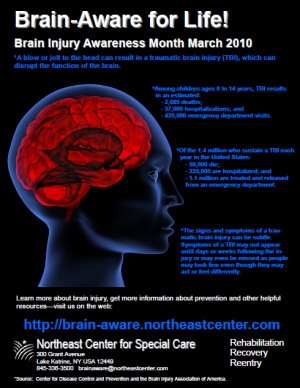
There are MANY commemorative months celebrated by this nation and/or used to raise awareness. I wonder why republicans take issue with ONLY this particular celebration.
[edit]January
National Stalking Awareness Month
[edit]February
United States Navy sailors and Marines watching a dance performance in celebration of Black History Month
Black History Month (USA)
Career and Technical Education Month[1]
[edit]March
Irish-American Heritage Month
National Nutrition Month[2]
Women's History Month
National Middle Level Education Month
National Brain Injury Awareness Month[3]
National Essential Tremor Awareness Month[4]
[edit]April
Jazz Appreciation Month
National Poetry Month
Mathematics Awareness Month[5]
Sexual Assault Awareness Month[6]
Parkinson Awareness Month[7]
Autism Awareness Month
Asperger's Syndrome Awareness Month
[edit]May
Jewish American Heritage month
ALS Awareness Month (United States)
National Bike Month
South Asian Heritage Month
Haitian Heritage Month
Asian Pacific American Heritage Month
Asthma Awareness Month[9]
National Pet Month
Celiac Awareness Month
National Guide Dog Month
Jewish American Heritage Month
National Foster Care Month
[edit]June
ALS Awareness Month (Canada)
Caribbean American Heritage Month
LGBT Pride Month (Lesbian, Gay, Bisexual and Transgender)
July
Dance Appreciation Month
National Hotdog Month
]August
National Immunization Awareness Month (USA)
September
United States Navy personnel celebrating National Hispanic Heritage Month
National Guide Dog Month (2010 to present)
National Hispanic Heritage Month (September 15 to October 15)
National Honey Month
National Yoga Month
National Chiari Malformation Awareness Month
National Preparedness Month
National Ovarian Cancer Awareness Month
National Pomegranate Tootsie Roll Pop Awareness Month
October
Domestic Violence Awareness Month
Black History Month (UK)
National Book Month
National Work and Family Month
National Breast Cancer Awareness Month
National CyberSecurity Awareness Month
National Brain Tumour Awareness Month (CAD)
Filipino American History Month
LGBT History Month
National Bullying Prevention Month
National Spina Bifida Awareness Month -
[edit]November
November
National American Indian & Alaska Native Heritage Month
COPD Awareness Month
National Stomach Cancer Awareness Month
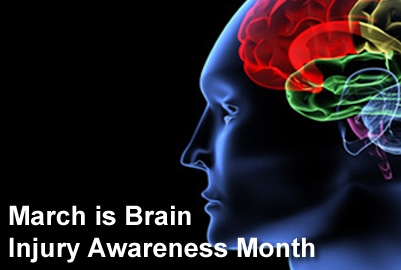
Months represents and the colors?
I just listed the one's relating to very common dieases, and also by it's relevancy to your examples but there are more at my source. I hope this helps! :)
November - National Epilepsy Awareness Month (Purple)
Lung Cancer Awareness Month (Clear or Pearl)
National Novel Writing Month (Light Blue)
National American Indian & Alaska Native Heritage Month (None)
December - Political Correctness Awareness Month (None)
Safe Toys and Gifts Awareness Month (None)
January - Birth Defects Prevention Month (Pink and Blue)
Cervical Cancer Awareness Month (Teal)
February - African-American History Month (Red, Yellow, Green)
American Heart Month (Red)
Thyroid Disease Awareness Month (Light Blue)
March - Brain Injury Awareness Month (Green)
Colorectal Cancer Awareness Month (Blue)
Endometriosis Awareness Month (Yellow)
Women's History Month (None)
Greek-American Heritage Month (None)
Irish-American Heritage Month (None)
April - Alcohol Awareness Month (None)
Arab-American Heritage Month (None)
Autism Awareness Month (Red, Yellow, Blue, and Light Blue)
Cancer Control Month (None)
Child Abuse Prevention Month (Blue)
Sexual Assault Awareness Month (Teal)
May - Asian Pacific American Heritage Month (None)
Jewish American Heritage Month (None)
Brain Tumor Awareness Month (Grey)
June - AIDS Awareness Month (Red)
ALS Lou Gehrig’s Disease Awareness Month (None)
Gay and Lesbian Pride Month (Rainbow)
July - Eye Injury Prevention Month (None)
French-American Heritage Month (None)
Group B Strep Awareness Month (Light Blue, White, Light Pink)
August - Amblyopia Awareness Month (None)
Cataract Awareness Month (None)
Immunization Awareness Month (None)
Psoriasis Awareness Month (None)
Spinal Muscular Atrophy Awareness Month (Light Gold)
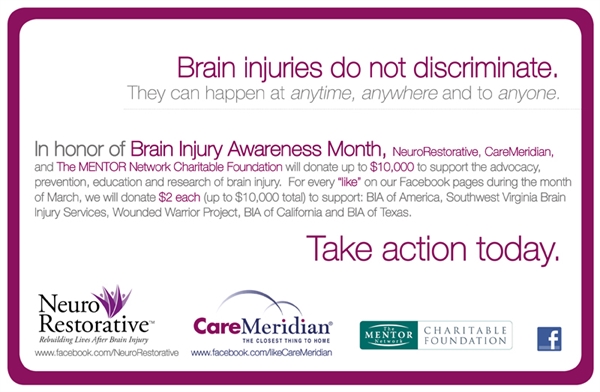
need information on closed head injury and specific language impairment. thankk youu?
Main differences between a child with a Closed Head Injury and a child with a Specific Language Impairment:
1) Cause: Closed head injury is an injury or blunt trauma to the brain inside an intact skull. Injury to the brain causes swelling, which quickly increases the pressure within the skull (intracranial pressure). The increased pressure causes more damage to the brain, which causes more swelling, and so on. CHI is most commonly associated
with motor vehicle, motor vehicle–pedestrian, or motor
vehicle–bike accidents; falls; or sports-related injuries, but
they can also be associated with incidents that result in a
severe lack of oxygen to the brain such as near drowning or
cardiac arrest.
Common names for closed head injuries include concussion epidural hematoma subdural hematoma and intracerebral hemorrhage
Some types of closed head injury stop the cycle automatically (concussion), while others will continue to get worse until the victim dies (epidural hematoma)
The term does not apply to brain injuries that are congenital or degenerative, or brain injuries induced by birth trauma.
Specific language impairment (SLI) describes a condition of markedly delayed language development in the absence of any apparent handicapping conditions
Many different terms have been used to describe the childhood disorder that is characterized by markedly delayed language development in the absence of any conditions such as deafness, autism, or mental retardation that would explain the delay. SLI is also sometimes called childhood dysphasia or developmental language disorder
3) A TBI or CHI can caused SLE such as a battered child or shaken child syndrome.
4) Area of the injury in the brain:
Closed head injury ( CHI) or traumatic brain injury(TBI) - frontal lobe
SLE( specific language impairment) - left hemisphere.
5) Brain abnormality and genetics can play a role in SLE.It's a developmental disorder.
6) CHI may cause difficulty in expressive communication..and a difficulty in perceptual ability with the processing of rapidly timed events of which speech is the most taxing example.
7) CHI -The trauma is often followed by coma, lasting from minutes to weeks or months
8) Children with a brain injury often have cognitive and communication deficits that significantly impact their ability to function.
If a parent notices that a child is having problems with speech or is not achieving language milestones around the usual time, a doctor should be consulted.
TBI may cause difficulty with expressive communication. There may be word-finding difficulties, an inability to express an idea appropriately, or difficulty providing explanations. There can also be inconsistencies with receptive language within either the written and/or the spoken word.
9) The prognosis for children with SLI depends very heavily on the type and severity of the language problem experienced. Many language problems can be largely overcome, although some difficulties usually persist SLI can lead to decreased social interaction and decreased school performance.because of their difficulty in mastering the language. Prognosis for CHI might be fatal. depending on the severity and location of the injury.
10) There is no way to prevent SLE. compared to CHI. which causative factors can be avoided.
11)Children with a brain injury often have cognitive (thinking) and communication problems that significantly impair their ability to live independently. These problems vary depending on how widespread brain damage is and the location of the injury.
Cognition (thinking skills) includes an awareness of one's surroundings, attention to tasks, memory, reasoning, problem solving, and executive functioning (e.g., goal setting, planning, initiating, self-awareness, self-monitoring and evaluation). Problems vary depending on the location and severity of the brain injury.
It may be an effort for them to understand both written and spoken messages, as if they were trying to comprehend a foreign language. The child may have difficulty with spelling, writing, and reading, as well.
The person may have trouble with social communication.
In addition to all of the above, muscles of the lips and tongue may be weaker or less coordinated after TBI. The child may have trouble speaking clearly. The child may not be able to speak loudly enough to be heard in conversation. Muscles may be so weak that the child is unable to speak at all. Weak muscles may also limit the ability to chew and swallow effectively.
Cognitive difficulties are very common in people with TBI. Cognition (thinking skills) includes an awareness of one's surroundings, attention to tasks, memory, reasoning, problem solving, and executive functioning (e.g., goal setting, planning, initiating, self-awareness, self-monitoring and evaluation).
Problems vary depending on the location and severity of the injury to the brain and may include the following:The child with SLI also often has difficulties learning a new language. Children with SLI are not cognitively impaired and are not withdrawn or socially aloof like an autistic child.
The child with SLI may have trouble concentrating. The child might have difficulty in reading.
12) A child with closed head injury or TBI may have problems with recent memory. New learning can be difficult. Long-term memory for events and things that occurred before the injury, however, is generally unaffected (e.g., the person will remember names of friends and family).
.After brain injury, things that once were easy and familiar become strange and difficult. Intensive mental effort is usually required to do things that required little or no effort before brain injury. Work and school, personal and family life often suffer too. Typically, children become unmanageable, grades drop, personalities change and they regress to a earlier developmental stage.
Specific language impairment does not involve global developmental delays; children with SLI function within the typical range in non-linguistic areas, such as nonverbal social interaction, play, and self-help skills (e.g., feeding and dressing themselves). Children with autism spectrum disorders have core impairments in social interaction and communication, including both nonverbal and verbal skills, as well as certain characteristic behaviors (e.g., repetitive movements, lack of pretend play, and inflexible adherence to routines) that are not found in youngsters with SLI.












